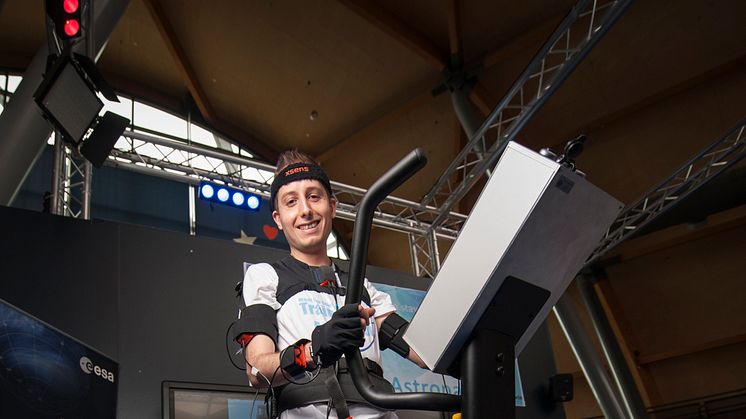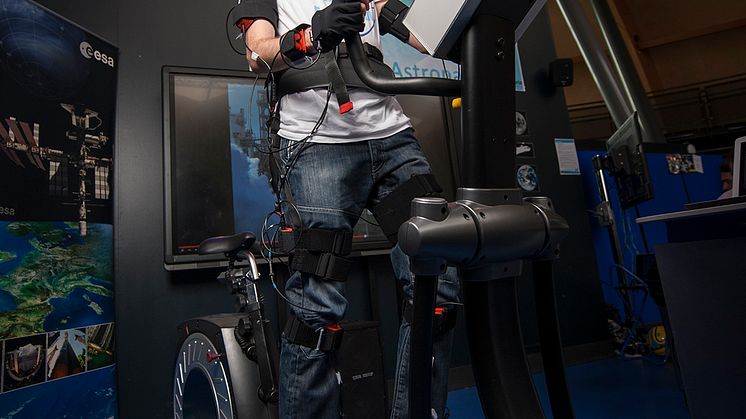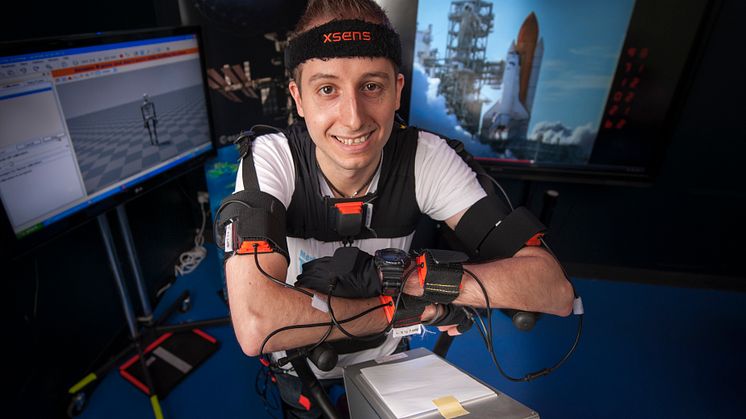
Press release -
Northumbria space researcher soars into the stratosphere with industry award
A Northumbria student is celebrating stratospheric success after receiving industry recognition for his work in helping combat astronauts’ back pain when they return home from space.
Zero gravity in space leads to back pain in astronauts because it eliminates the normal body weight loading of the spine, resulting in spinal discs deconditioning. Although astronauts exercise to try to counteract these effects, they need to undergo rehabilitation for a number of months when they return to earth to rebuild their strength and re-establish spinal control.
While at the 2015 UK Space Conference, PhD student and trained physiotherapist Andrew Winnard was awarded the prestigious Evetts Award for Outstanding Contribution to UK Space Life and Biomedical Sciences for his research and contributions to the industry.
Andrew is currently working with senior lecturer Dr Dorothee Debuse on the ‘Functional Re-adaptive Exercise Device’, known as FRED, which has been created to combat the back problems astronauts suffer when they return to earth. He caught the judges’ attention with his work on the device which could be used by astronauts’ undergoing rehabilitation as well as by those suffering with severe lower back pain and muscle wastage issues.
FRED was displayed as part of Newcastle’s Centre for Life’s ‘Meet the Scientist’ summer programme, where Andrew worked with the public who were able to participate in live experiments being carried out.
Andrew, from Chesterfield, Derbyshire, studied Biomedical Science and Physiotherapy before embarking on his PhD. He said: “It’s an honour to pick up this award for something I feel so passionately about and in such a competitive, innovative and exciting industry.
“Significant parallels exist between every day back pain and the rehabilitation an astronaut receives after being in space. There is considerable scope for the equipment to help people outside of the industry and create solutions for everyday citizens. I’d be thrilled if FRED research was eventually used as part of everyday medicine.”
Andrew’s research into Space Life and Biomedical Sciences has already led to commendations from industry representatives. Earlier this year, he was awarded the Aerospace Medical Association (AsMA) Travel Scholarship to present the FRED research at the AsMA annual meeting in Orlando, Florida. Andrew’s Principal Supervisor Dr Nick Caplan, a Reader in Health and Rehabilitation in the University’s Department of Sport, Exercise and Rehabilitation, said: “Because spinal muscles waste away when astronauts are in space, the European Space Agency’s Space Medicine Office has prioritised “spinal and core health” as one of its key developmental areas.
“FRED is one of their two flagship projects; the work originated out of Northumbria and the Space Medicine Office is now funding us to develop FRED further, which is fantastic news and testament to the hard work and dedication invested by Andrew throughout his PhD studies to date.”
Professor Simon Evetts, International Collaborations Development Manager at the Space Medicine Office in Cologne, Germany, is a visiting professor at Northumbria and was one of the judging panel at the conference. He commented: “Andrew’s valuable research contributions and the roles of responsibility he has taken on over the years makes him a real asset to the industry and fitting award-winner.
“His enthusiasm, academic background, ability to succeed and willingness to learn and apply himself to support UK space activities has shown he has the qualities of a future leader in the industry.”
Northumbria University is a world leader in astronaut spinal health and rehabilitation research and academics are constantly looking at how their research relates to healthcare on Earth.
For more information on Northumbria’s Department of Sport, Exercise and Rehabilitation visitwww.northumbria.ac.uk/sportrehab
Topics
Categories
Northumbria is a research-rich, business-focused, professional university with a global reputation for academic excellence. To find out more about our courses go to www.northumbria.ac.uk
If you have a media enquiry please contact our Media and Communications team at media.communications@northumbria.ac.uk or call 0191 227 4571.








